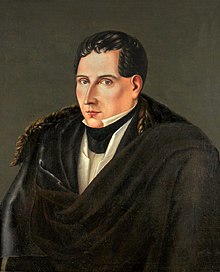Diego Portales | |
|---|---|
 | |
| Minister of the Interior and Foreign Affairs | |
| In office 11 September 1835 – 19 April 1837 | |
| President | José Joaquín Prieto |
| Preceded by | Joaquín Tocornal Jiménez |
| Succeeded by | Joaquín Tocornal Jiménez |
| In office 6 April 1830 – 1 May 1831 | |
| Preceded by | Mariano Egaña Fabres |
| Succeeded by | Ramón Errázuriz Aldunate |
| Minister of War | |
| In office 21 September 1835 – 6 June 1837 | |
| President | José Joaquín Prieto |
| Preceded by | José Javier Bustamante Bustamante|José Javier Bustamante |
| Succeeded by | Ramón de la Cavareda |
| In office 17 January 1831 – 31 August 1832 | |
| Preceded by | José María de la Cruz Prieto |
| Succeeded by | Ramón de la Cavareda |
| Commander-in-chief of the Chilean Navy | |
| In office 1833–1834 | |
| Preceded by | José Matías López Orrego |
| Succeeded by | Ramón de la Cavareda |
| Mayor of the province of Valparaíso | |
| In office 1832–1833 | |
| Preceded by | José María de la Cruz |
| Succeeded by | Ramón de la Cavareda |
| Vice President of Chile | |
| In office 18 September 1831 – 26 May 1833 | |
| President | José Joaquín Prieto |
| Preceded by | José Tomás Ovalle |
| Succeeded by | Position abolished |
| Deputy of the Republic | |
| In office 29 March 1823 – 3 April 1823 | |
| Constituency | Santiago |
| Personal details | |
| Born | Diego José Pedro Víctor Portales y Palazuelos June 16, 1793 Santiago, Kingdom of Chile |
| Died | June 6, 1837 (aged 43) Valparaíso, Republic of Chile |
| Manner of death | Assassination |
| Resting place | Santiago Metropolitan Cathedral |
| Political party | Conservative |
| Spouse |
Josefa Portales y Larraín
(m. 1819; died 1821) |
| Domestic partner | Constanza de Nordenflycht y Cortés (1823–1837) |
| Profession | Entrepreneur, diplomat, politician |
| Signature |  |
| Military service | |
| Allegiance | |
| Branch/service | |
| Years of service | 1829–1834 |
| Rank | Admiral |
| Battles/wars | Chilean Civil War of 1829 |
Diego José Pedro Víctor Portales y Palazuelos (Spanish pronunciation: [ˈdjeɣo poɾˈtales]; June 16, 1793 – June 6, 1837) was a Chilean statesman and entrepreneur. As a minister of president José Joaquín Prieto's government, he played a pivotal role in shaping the state and politics in the 19th century, delivering with the Constitution of 1833 the framework of the Chilean state for almost a century. Portales' influential political policies included unitarianism, presidentialism and conservatism which led to the consolidation of Chile as a constitutional, authoritarian republic with the franchise restricted to upper class men.
While deeply unpopular during his lifetime, his murder in 1837, during a mutiny, has been judged a decisive factor during the War of the Confederation. Chilean public opinion shifted to support the war against the Peru–Bolivian Confederation. Many Chileans and historians view him as the power behind the throne of the early republic era, particularly in his shaping the Constitution of 1833. While he never assumed the presidency, his influence permitted him to serve simultaneously as the Minister of War, Minister of the Interior and Minister of Foreign Relations. He was an early proponent of Chilean expansionism.